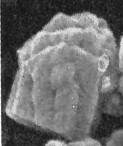Sphenolithus compactus
Set number: 892
-
1
-
2
-
3
-
4
10µm
Set number: 867
-
1
-
2
-
3
-
4
10µm
Set number: 891
-
1
-
2
-
3
-
4
10µm
Set number: 921
-
1
-
2
-
3
-
4
10µm
Sphenolithus compactus Backman, 1980
Sphenolithus paratintinnabulum Bergen & de Kaenel in Bergen et al., 2017
The precise age of the holotype sample was obtained from the chart provided by Perch-Nielsen, 1972b.
Very small (2.0-4.0µm), elongated species of Sphenolithus Deflandre in Grassé, 1952 having a diminutive clustered apical cycle resembles a bouquet of flower at 45° [its segments radiating outward distally]. The apical cycle shows maximum birefringence at 45° but extinct (dim) at 0° (parallel extinction).
The lateral cycle is diminutive and its segments are aligned longitudinally at 0° in cross-polarised light.
The height of the elongated cylindrical proximal cycle with a concave base is always distinctly greater than the height of the apical cycle.
In the cylindrical proximal cycle, the inner ends of segments joined most of their length along the longitudinal axis but not joined nearer the proximal end thus forming a very shallow conical proximal cavity.
In the light microscope, in the axial section, the segments of the proximal cycle are irregular quadrilateral.
Sphenolithus compactus differs from Sphenolithus disbelemnos Fornaciari and Rio,1996 by being smaller than 3.0µm.
Sphenolithus compactus is distinguished from Sphenolithus tintinnabulum Maiorano & Monechi 1997 by having a cylindrical proximal cycle. In contrast, the latter has a frustum shape proximal cycle, thus producing a truncated triangular appearance in the axial section.
Backman, J. 1980. Miocene-Pliocene nannofossils and sedimentation rates in the Hatton-Rockall Basin, NE Atlantic Ocean. Stockholm Contributions in Geology 36: 1-91.
Bergen, J. A., de Kaenel, E., Blair, S. A., Boesiger, T. M. & Browning, E. 2017. Oligocene-Pliocene taxonomy and stratigraphy of the genus Sphenolithus in the circum North Atlantic Basin: Gulf of Mexico and ODP Leg 154. Journal of Nannoplankton Research 37(2-3): 77-112.
Deflandre, G. 1952. Classe des Coccolithophoridés. (Coccolithophoridae. Lohmann, 1902). In: Grassé, P. P. (Ed.), Traité de Zoologie. Masson, Paris. 439-470.
Fornaciari, E., Rio, D., 1996. Latest Oligocene to early Middle Miocene quantitative calcareous nannofossil biostratigraphy in the Mediterranean region. Micropaleontology 42(1), 1-37
Maiorano, P., Monechi, S., 1997. New Early Miocene species of Sphenolithus Deflandre, 1952 from the North Atlantic Ocean. Journal of Nannoplankton Research 19(2), 103-107.
Perch-Nielsen, K., 1972b. Remarks on Late Cretaceous to Pleistocene coccoliths from the North Atlantic. Initial Reports of the Deep Sea Drilling Project 12, 1003-1069.
